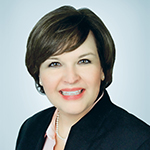By PATRICIA CORRIGAN
June 3, 2020
When Deborah Simmen looks back at "the winding ways we've traveled" and takes into account when many Catholic health care systems in the U.S. were founded and how they were grounded "in times of epidemics and deep suffering," she sees cause for hope today.

Simmen
"We got through it. We survived as a community, a nation and a ministry of Catholic health care," said Simmen, system vice president, mission integration and ministry formation and also executive advisor for spiritual care at SCL Health, based in Broomfield, Colorado. "COVID-19 is a repetition of our legacy and our story, and highlights the need for the Catholic health care ministry across the country."
Simmen spoke May 27 at the third session of "Our Well-Being: A Webinar Series Sharing Wellness Resources." CHA launched the four-part series to share workforce wellness practices of members and additional trusted wellness resources, practices and programs "to help all involved in Catholic health care identify and address their immediate needs, as well as the post-COVID reality." Participation is free to CHA members, but preregistration is required. CHA members can access recordings of the webinars and handouts on the association's website.
The fourth and final 45-minute web seminar, "Bracing for the Mental Health Impact of COVID-19," will take place at 2 p.m. Eastern time on June 3. Deryk Van Brunt, Dr.PH, co-founder and chief executive director of the digital platform CredibleMind, will discuss resources for flattening the mental health impact that is being called "The Second Curve" of the COVID-19 pandemic.
In the May 27 session, Simmen shared tools and resources that have helped SCL Health provide compassionate care and traumatic stress management for the system's associates. She expressed pride in the work of the system's associates and leadership team. Then, remarking on an historic photo of the Sisters of Charity Leavenworth, Simmen said, "It looks different today, but spirituality is embedded in everything we do." She said, "Meeting mental and emotional needs, we engage at a deeper level."
Some of the ways SCL Health has responded to the "physical, safety and financial wellbeing
needs" include:
- Providing online ordering, and in-hospital pickup of select grocery items
- Providing resources and access to IT support staff for individuals working at home
- Establishment of a relief fund, issuing emergency crisis grants
- Providing emergency time off
- Setting zero co-pays for telehealth appointments
- Assisting with costs of childcare and elder care
- Providing on-line educational resources for associates with children
On-line grief support, counseling and resources for mindfulness techniques such as yoga or meditation also are available, Simmen said.
A "modified praying of the hours" has associates praying for caregivers, patients, their families, community leaders and world leaders, a practice "intended to unify us as a ministry." Associates also form "compassion circles, hold huddles at shift changes "to allow caregivers to reframe their experiences and share gratitude and kindness," a practice Simmen said is helpful for emotional and spiritual well-being.
Simmen said SCL offers its employees access to meQuilibrium, an app with activities aimed at building resilience and healthy behaviors. "It has 24/7 access and allows associates to find their own plan and make it applicable to specific needs. It's for the Millennials who would like some support."
Simmen noted that "Colorado is opening back up, "but there is anxiety about how to re-open and support our associates."
SCL Health also has turned to the Substance Abuse and Mental Health Services Administration for resources on recovering from disasters and to resources from the Schwartz Center for Compassionate Healthcare for practical insights.
"These tools are our best effort to anticipate, and we're now looking again at how to address needs," Simmen said. She quoted psychologist and author Arielle Schwartz, who wrote, "The work of trauma recovery is difficult but this same work can uncover wisdom and awaken the heart."
Challenges in the coming weeks include how to equip associates throughout the system to be aware of associates' mental states, how to be present without having to fix or take on the suffering of another and how to be able to look out for one another, Simmen said.
"Most of our focus will be on this, and how to create meaning and purpose around this time in history," she said. "What is needed is to embrace change and embrace what will take us to the next level."
Coverage of prior webinar in this series
SSM Health put its staff wellness plan into high gear to cope with pandemic stress
Caregivers ride emotional roller coaster from heroic wins to devastating loss
View the webinar recording (member log-in required)